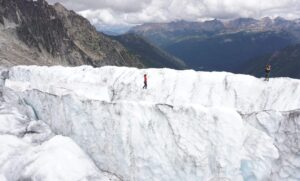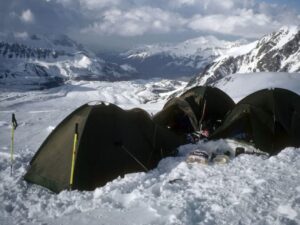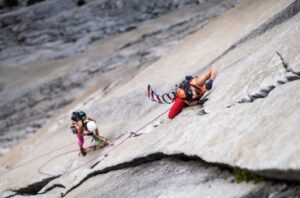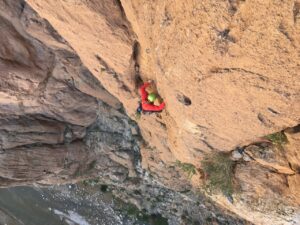Editor’s note: COVID-19 has not only canceled adventures, it has also led to some. To kick off this casual series, a polar cyclist struggles to get home to northern Spain, still wearing his arctic gear.
Gaizka Aseguinolaza enjoys cycling in the polar regions and was planning his second attempt to cover the Iditarod Trail in Alaska this March. The year before, he missed the chance to do the 600km version of the bike race when the organizer went broke.
He decided to do the route by himself, without racing. He says it was the best experience of his life. Unfortunately, unseasonal rain and mild weather forced him to leave the final third of the route undone. Aseguinolaza vowed he’d return to complete the challenge.
When the time came to buy his ticket to Alaska, however, an uneasy feeling made him change his mind. News of a virus spreading in China had barely started, and nothing suggested the crisis that would soon follow.
“Call it intuition or whatever,” the cyclist told ExplorersWeb, “but I had that feeling that this was not going to be the right year for long-hauls, so I decided to try something shorter and nearer.”
Aseguinolaza eventually decided to cross 125km-wide Lake Inari in Lapland with two friends, brothers Alex and Eduardo Benito. They planned to use the well-supplied cabins along the way — a conservative enough project for experienced adventure cyclists.
But as their departure date loomed, so did the news about the disease spreading to Europe and causing havoc in Italy. On the other hand, they figured they’d be isolated in a lonely place. Surely the problem would be over when they returned?

Midway across Lake Inari. Photo: Gaizka Aseguinolaza
The three drove from their home in Bilbao, in northern Spain’s Basque country, to the Barcelona airport. Here, they took a flight to Helsinki and then Ivalo. “The trip itself was awesome: a week to cover 125km in mainly good (that is, cold), hard ice conditions, which let us ride fast,” he recalled. Just once, they endured strong winds and snow which forced them to drag their bikes all day.
A busy entrepreneur in his daily life, Aseguinolaza enjoyed the silence, the openness and the isolation, especially thanks to the the lack of cell phone coverage. The itinerary was not as popular as they had expected, and they only crossed paths with a French skier. Little did they know that that countries had by now begun restricting travel.

Dragging the bikes through fresh snow. Photo: Gaizka Aseguinolaza
“Our cell connection only came back the day we finished the crossing, as we approached the village of Sevettijärvi,” the Basque cyclist said. “Then we saw the missed calls and texts from family, friends…and the airline, informing us that our return flight had been cancelled, since borders were closing.”
The ride had ended, but the true adventure was about to begin.
“We thumbed a ride and begged the driver to take us to the Ivalo airport. Once there, I droned on and on at the check-in counters until at the last minute, I managed to get us on one of the last planes leaving the country. It would take us to Munich, from which we hopped another plane for Barcelona.”
“We had to rush to check our duffel bag to Barcelona, with no time to change clothes or shower after seven days cycling in the cold. I, in particular, looked quite ragged in my polar gear: aging bright-orange pants, second-hand Sorel boots and my old parka with its homemade ruff of fox tails from a 1980s coat that my mom had forgotten in the attic.”

Fox tails from an old coat made a handy ruff in arctic conditions but were less suitable driving through Spain. Photo: Gaizka Aseguinolaza
“We felt happy because it seemed an easy way out, given the circumstances. But in Barcelona, a new obstacle arose: We picked up the bikes, but our duffel bags had gone astray, with all our spare clothes — and the car keys!”
“We had been traveling for 23 hours, but we couldn’t afford to wait for our luggage. Spain had declared a state of emergency and imposed a strict lockdown on the entire country. All non-essential movement was forbidden. But we managed to rent a van and drove at night out of Barcelona, which looked like a town under siege. It was far from clear what would happen if we were stopped at a roadblock, wearing polar clothing and ready to tell the cops that we had just come from the Arctic Circle.”
“Maybe thanks to the fact that we drove late at night, no one stopped us, and we managed not to fall asleep along the way. We finally arrived home at 5am.
Aseguinolaza has no regrets about the trip: “The experience and freedom gave me the needed calm to endure the confinement,” he said. “Some may think that going ahead with the trip was irresponsible, and I admit that adventure travel has a selfish side, but we harmed nobody nor jeopardized anyone’s safety.”
Restrictions have now begun to lift in Spain, and outdoor exercise is permitted once a day. Aseguinolaza cycles and kayaks near home, and dreams of Alaska. “I definitely want to return there and complete the Iditarod Trail,” he says. “But my first trip out of Basque Country will be to Barcelona airport — my van is still there!”
Below, the video of their Inari crossing:





